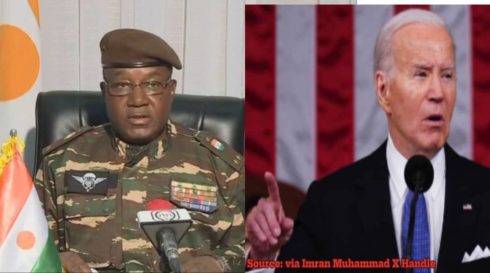In a surprising turn of events, Niger’s ruling junta has announced the immediate revocation of a military accord with the United States, according to junta spokesperson Colonel Amadou Abdramane. This decision comes following a recent visit by U.S. officials, led by Assistant Secretary of State for African Affairs Molly Phee and General Michael Langley, commander of the U.S. Africa Command. Abdramane revealed in a televised statement that the U.S. delegation’s visit lacked diplomatic protocol, as Niger was not adequately informed about the delegation’s composition, arrival date, or agenda.
The discussions during the visit reportedly centered around Niger’s ongoing military transition, bilateral military cooperation, and the nation’s choice of partners in combating militant groups affiliated with al Qaeda and Islamic State. The abrupt revocation of the military accord underscores the growing tensions between Niger’s ruling junta and the United States, signaling a shift in diplomatic relations between the two nations.
Diplomatic Fallout and Allegations of Interference
Colonel Abdramane’s condemnation of the American delegation’s behavior highlights the deepening diplomatic dispute between Niger and the United States. Abdramane expressed Niger’s regret over the perceived attempt by the U.S. delegation to dictate Niger’s choice of partners in addressing terrorism. Moreover, he vehemently denounced what he described as a “condescending attitude” and alleged threats of retaliation from the head of the American delegation towards Niger’s government and its people.
The junta’s decision to revoke the military accord underscores Niger’s assertion of its sovereignty and autonomy in international relations, particularly concerning its national security strategies. The rift between Niger and the United States could have significant implications for regional security cooperation, as Niger has increasingly turned to other global powers, such as Russia, for military support and partnership.
Implications for Regional Security and International Relations
The revocation of the military accord with the United States represents a significant shift in Niger’s foreign policy and military alliances. The decision to sever ties with the U.S. highlights Niger’s assertiveness in shaping its security agenda and underscores the limitations of Western influence in the region. As Niger, along with neighboring Mali and Burkina Faso, distances itself from Western military presence, it opens up opportunities for alternative partnerships and alliances, potentially reshaping the geopolitical landscape of the Sahel region.
The diplomatic fallout between Niger and the United States underscores the complexities of navigating security cooperation in Africa’s Sahel region, where multiple actors vie for influence and strategic interests intersect. The implications of this rift extend beyond bilateral relations, impacting regional security dynamics and potentially reshaping alliances in the fight against terrorism and insurgency. Amidst these geopolitical shifts, the future trajectory of Niger’s military transition and its choice of international partners remain uncertain, with broader implications for stability and security in the Sahel.
Niger’s Republic Concerns Over Unauthorized U.S. Military Presence Spark Diplomatic Rift
The termination of the military accord between Niger Republic and the United States has laid bare simmering tensions over the presence of American troops within Niger’s borders. Central to Niger’s decision was the operation of Air Base 201, a drone base constructed near Agadez at a cost exceeding $100 million. While initially intended for counterterrorism operations targeting Islamic State militants and al Qaeda affiliates in the Sahel region, the base’s operation became a focal point of contention.
Niger’s assertion of the illegality of U.S. troop presence underscores broader concerns over sovereignty and transparency in international military agreements. The unilateral imposition of the accord in 2012 without adequate consultation or oversight fueled sentiments of distrust and unease within Niger’s government and populace. The lack of clarity regarding the number of U.S. personnel and equipment further exacerbated tensions, raising questions about accountability and sovereignty.
As Niger takes decisive action to revoke the military accord, the rift between the two nations highlights the complexities of security cooperation in the Sahel region. Moving forward, resolving the diplomatic impasse will necessitate frank dialogue and a commitment to mutual respect and transparency. The termination of the accord serves as a stark reminder of the importance of upholding sovereign rights and democratic principles in international relations, particularly in matters concerning national security and military cooperation.
Table of Contents
Discover more from OGM News NG
Subscribe to get the latest posts sent to your email.














